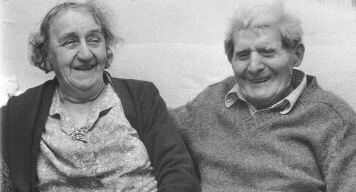
". . .one harvest. . .was so backward, rain-drenched and disastrous, that its shadow has passed down into modern times. . . .it was August 28 [1879] before Bures, Long Melford, Chelsworth and Wickham Schools eventually closed for the corn harvest, whilst Borley school did not restart until October 6th." p. 106.

Pages 118-19, there is a description of days at Borley School, along with an etching of the building. Noy scanned to preserve binding.
In the photo section, the author writes, "At Borley one cold February afternoon, I met two of our most endearing contributors, Alf and Maggie Finch whose cottage overlooks the fields where Alf was a horseman for all of his working life. With rich North-Essex vernacular, bright twinkling eyes and most of all a warmth of willing humour, we had some wonderful afternoons recording the Borley of bygone years." Maggie Finch was born in 1904, which would probably place her service as a maid at Borley Rectory during Harry's incumbancy. Neither name shows up in books about the haunting. Maggie recalled, "At Borley Rectory, the rector's wife would come down the stairs backwards to make sure that the carpet had been thoroughly brushed and dusted." Maggie was also expected to clean the "famous Church" for no extra pay. She said, "The cook received 2/6d extra, but, as I was the maid, I was expected to do it for God!" pp. 155-56.
Maggie gives us an intimate look inside the rectory; ". . .we had to go into the study about 8:30 whilst Reverend Bull read from the Bible and said prayers. But the gardener would look through the window and pull funny faces and try to make us laugh, whilst we knelt beside the chairs!" p. 158.
Prior to WWI, farm workers put in six full days, but after 1918, the work schedule ended after lunch Saturday. Alf Finch recalled, "The best thing ever invented was the Saturday afternoon holiday for farmworkers.. . . .as soon as we had it, we formed [the] Borley Football Club." p. 187.
Time and energy was also devoted to cricket. The author muses, "How I wish this entire book had been devoted to cricket! The scorebooks and anecdotes reveal so much of our human history. . . .yet happily there is still a perceptible thread which links contemporary players with those of yesteryear. . . .the lad with the bright twinkling eyes [on the contemporary football club]. . . .bears not only a striking resemblance to our heroic Borley schoolboy and horseman Alf Finch - but is indeed his look-alike grandson!" p. 206.
Alf recalled, "To start with Borley had a [football] team of its own - although later we had to go in with Foxearth to make the numbers up. We used to play Lavenham, Acton, Clare, Cavendish and Sudbury Swifts and travelled in one of John Palmer of Melford's 'brakes.' It would be pulled by a pair of horses but is wasn't covered in - so you hoped it wasn't raining! For 'home games' we used a meadow at the back of the Church. Something else we used to play though - on week-day evenings - were quoits. I've seen a dozen men on Borley green playing at quoits!" p. 208.
Eddie Tuffin recalled that at Borley "a 'club room' with billiard table, crads, and dominoes was opened three nights a week." p. 208. The location of the 'club room' is not given.
During WWI, a Home Guard was established. It was made up of Local Defence Volunteers, who would hold drills from time to time. Alf Finch told of one winter exercise; ". . . we went to Bull Lane in Melford to do an exercise in fire control. . . . we had to crawl about on the floor of this 'ere derelict house pretending there was a fire on. Pretending there was a fire! It was as cold as hell!" Another exercise went on all night guarding a hill; "What [were we guarding]? I don't know! I've spent 50 years wondering and I still don't know!" p. 219.